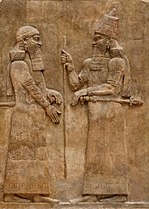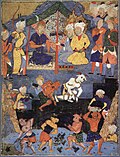The Cyrus Cylinder is an ancient clay cylinder, now broken into several pieces, on which is written an Achaemenid royal inscription in Akkadian cuneiform...
112 KB (13,100 words) - 13:07, 21 October 2024
Cyrus II of Persia (Old Persian: 𐎤𐎢𐎽𐎢𐏁, romanized: 𐎤𐎢𐎽𐎢𐏁 Kūruš; c. 600 – 530 BC), commonly known as Cyrus the Great, was the founder of the...
112 KB (12,783 words) - 23:19, 3 November 2024
Cyrus the Great was the founder of the Achaemenid Empire and king of Persia from 559 to 530 BC. He is venerated in the Tanakh as Cyrus the Messiah for...
22 KB (3,275 words) - 10:45, 25 October 2024
Fall of Babylon (category Battles of Cyrus the Great)
incorporated into the Persian empire as a satrapy. As recorded in the Cyrus Cylinder, Cyrus vowed to respect the Babylonian people. He also allowed exiled peoples...
23 KB (2,877 words) - 19:56, 3 November 2024
Cyaxares II (section The Cyrus Cylinder)
and he was also the brother of Mandane, Cyrus the Great's mother (1.2.1, 1.4.7). He describes the Persian, Cyrus II/The Great, as leading the campaign to...
32 KB (4,725 words) - 00:05, 29 October 2024
Return to Zion (category Cyrus the Great)
Persian conquest of Babylon. In 539 BCE, the Persian king Cyrus the Great issued the Edict of Cyrus allowing the Jews to return to Jerusalem and the Land...
13 KB (1,654 words) - 16:40, 30 October 2024
The Edict of Cyrus usually refers to the biblical account of a proclamation by Cyrus the Great, the founding king of the Achaemenid Persian Empire, in...
12 KB (1,940 words) - 02:53, 9 September 2024
titles assumed by Cyrus the Great of the Achaemenid Empire after his conquest of Babylon in 539 BC. In the text of the Cyrus Cylinder, Cyrus assumes several...
37 KB (4,269 words) - 04:45, 7 October 2024
In it was displayed the Cyrus Cylinder, which the Shah promoted as "the first human rights charter in history". The cylinder was also the official symbol...
31 KB (2,294 words) - 10:30, 31 October 2024
Dhu al-Qarnayn (redirect from Theories about Cyrus the Great in the Quran)
commentaries identifying Dhu al-Qarnayn as Cyrus. Archeological evidence cited includes the Cyrus Cylinder, which portrays Cyrus as a worshipper of the Babylonian...
54 KB (5,183 words) - 09:34, 22 October 2024








